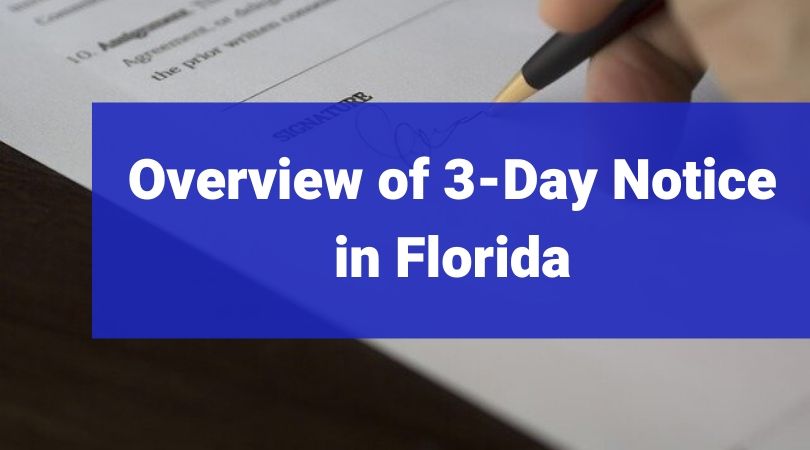
Dealing with an eviction is never fun for anyone as different laws can complicate the overall process. The process can also be delayed if there are inaccuracies in the notice or court measures. The landlord should know and understand the necessary measures before delivering their tenant with this notice. If the landlord puts the necessary methods into place, they will be able to regain their property from their tenant in the time frame stated.
Three-Day Notice in Florida
The 3-Day Notice to Quit is a legal document served to the tenant by the property owner, in an attempt to fix a lease violation. If the tenant does not pay their rent, their landlord has the authority to evict them. The renter can choose to pay their rent upon receiving the notice within the three days or leave the property.
The day the notice was delivered to the tenant does not count as part of the 3-day notice, nor do weekends, holidays, or if the court clerk’s office is closed for any reason.
Laws to Follow for Serving a 3-Day Notice to Quit in Orlando, FL
There are laws and regulations you must follow when serving a 3-Day Notice to Quit in Orlando, Florida.

The landlord must present the tenant with the 3-day notice as the initial step. The notice must be in written form and include the necessary information:
- The notice should include a statement that rent was not paid and when the rent was due, the exact amount of rent that was to be paid, and the date the rent must be compensated by, the tenant(s) name, telephone number, and address of the landlord.
- The landlord can deliver the notice to the renter directly (post it on their door if applicable) or mail it to them. If the landlord chooses to mail, they can do so by registered, certified, or regular mail. A receipt upon mailing is highly encouraged.
- The laws in Orlando, Florida only require a landlord to give their tenant a 3-day notice to quit.
Reasons to Send a Tenant a 3-Day Notice to Quit
There are many reasons you may need to serve a 3-Day Notice to Quit in Orlando, Florida aside from a tenant not paying rent. Some of the reasons include the tenant breaking the lease, law infractions, or not abiding by health regulations. It’s important to note that every lease can be different, and landlords could set different grace periods for paying rent that need to be abided by during the eviction process. The landlord cannot send out a 3-day notice to quit in regards to nonpayment of rent if the grace period is not over.

They should not use this notice as retaliation as it could result in legality issues and financial misfortune. The landlord should use this notice to quit only if they have to and if they have followed all the state laws in doing so.
Outcome of Serving a 3-Day Notice in Orlando, Florida
The outcome of serving a 3-Day Notice to Quit will go one of two ways:
- Tenant Obeys Notice
- Tenant Disregards Notice
If the tenant:
- Obeys the notice and pays the rent within the three-days, the landlord can no longer follow through with the eviction. If the tenant continues to not pay rent in the future, the landlord has the authority to repeat this process when compulsory.
- Disregards the notice by not paying the rent owed and chooses not to move out of the property within the 3-days, the landlord can file a summons and a complaint with the court in order to get control of their property back.
If the tenant moves out of the property within the 3-days but does not pay the rent that is outstanding, the landlord is allowed to utilize the tenant’s security deposit (if applicable).

If there is no security deposit or the security deposit does not cover the full cost of the rent, including late fees, the landlord can sue the tenant for the money that is still allocated. More information can be found on the Florida Senate page.
Disclaimer: This blog should not be used as a substitute for legal advice from a licensed attorney in your state. Laws frequently change, and this post might not be updated at the time of your reading. Please contact RentSmartUSA for any questions you have in regard to this content or any other aspect of your property management needs.